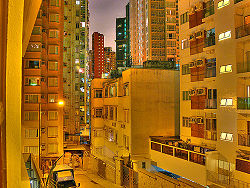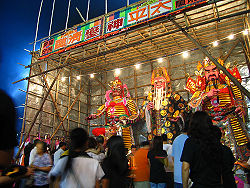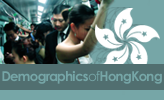Culture of Hong Kong
|
|
|---|
| Demographics and Culture of Hong Kong |
|
Census |
|
Demographics |
|
Culture |
|
|
|
Geography - History - Politics Hong Kong Portal |
The culture of Hong Kong can best be described as a foundation that began with China, and then leaned West for much of the 20th century under constructive British colonialism. Despite the 1997 transfer of sovereignty with the mainland, Hong Kong continues to hold an identity of its own.[1]
People in the culture

Most Hong Kong ethnic Chinese people naturally lean toward eastern culture, because demographically they are the majority. Many, though, have adopted western ways with substantial numbers still adhering to Chinese traditions. On various social aspects, the bottom-line Chinese values of "family solidarity", "courtesy" and "saving face" carry significant weight in the culture. Heavy influence is derived from Cantonese culture from the neighbouring province of Guangdong. There are also substantial communities of Hakka, Fukien, Teochiu and Shanghainese people. On the contrary, people have long been referred to by their origin in China.[2]. Overall the background of Hong Kong Chinese born after 1965 can be classified as westernized, since they have been influenced by liberal western cultural symbols[2].
Social

Structurally, one of the first laws to define people's relationship was the 1972 "Hong Kong Matrimonial Ordinance". The law set the precedence to ban concubinage and same sex marriages with a strict declaration for heterosexual relationships with one partner only[2].
Other economic changes include families in need of assistance due to both working parents. In particular, foreign domestic workers have become an integral part of the household since the late 1980s.
Languages
Cantonese is the most widely spoken language in Hong Kong. Since the 1997 handover, the government has adopted the "biliterate and trilingual" (兩文三語) policy. Under the principle, Chinese and English must both be acknowledged as official languages, with Cantonese being acknowledged as the de facto official spoken dialect of Chinese in Hong Kong, while also accepting the use of Standard Mandarin.
Superstition and beliefs

Despite the relatively modernized way of life, Chinese superstition still plays an integral part of the culture. Concepts like Fung shui are taken quite seriously. Expensive construction projects often include the hiring of consultants, that are believed to make or break a business. Other objects like bagua mirror are still used regularly to shield evils. Numbers in Chinese culture also play a role in people's everyday life. Numbers like "4" (because of its similarity to the Chinese word for "(to) die") are avoided when possible by believers. Other rituals like not using scissors on Chinese New Year are still around.
Holidays
There are some distinctive holidays celebrated by Hong Kong as part of the eastern culture, not participated in the west except in select overseas Chinese communities. The most well known is Chinese New Year, which occurs after every regular New Year. Other events include Dragon Boat Festival where zongzi is made by the millions at home as part of the tradition. Dragon boats also compete for regional awards. Mid-Autumn Festival is another highly celebrated event with massive purchase of mooncake around Chinese bakery shops.
Pop culture

Music: Cantopop has dominated and become synonymous with local music culture since its birth in Hong Kong. While many other forms of music exist, Cantopop still enjoys mass popularity. Yet, the global influence of Mandarin has been changing the style. Mandopop from Taiwan and China is fast gaining ground. Most artists are essentially multilingual, singing in Cantonese and Mandarin.
TV Dramas: Besides from the staple of TVB dramas, citizens also watch a lot of dramas from Japan, Korea and Taiwan. The most notable is Korea's Dae Jang Geum. Its 2005 broadcast on TVB was extremely popular. On the night of the series' finale the streets were unusually quiet due to people staying at home to watch the finale.
Celebrity: Hong Kong can be described as "gossip mad". The personal lives of singers, actors and celebrities in general are popular conversation topics and tabloid material. Hong Kong's thirst for gossip is not only limited to local celebrities, but celebrities from Taiwan, Japan and to a lesser degree Korea and Mainland China, are also welcomed. Many gossip magazines are also in circulation and one of the most notable/notorious sections is the "HD Reality" section. Introduced after the implementation of HD broadcasting, the section shows HD photos of celebrities and rather truthfully analysis of their attractiveness/unattractiveness. Naturally the section is very popular.
Food

Food holds an important place in Hong Kong culture. Restaurants are available in a level of convenience and variety unmatched by anywhere in the world. The fusion of east and west makes Hong Kong unique, especially in the close proximity where one can find any style any time. From dim sum, da been lo, fast food to the most rare of delicacies, Hong Kong carries the reputable label of "Gourmet Paradise" and "World's Fair of Food".
Fashion
In Later-19th century, the Victorian fashion vogue by British influence.
Shopping
Hong Kong is well identified by its materialistic culture and high levels of consumerism. Shops from the lowest end to the most upscale pack the streets in close proximity. The mild weather, low tax and convenience makes Hong Kong a premiere international shopping centre. Some popular shopping destination include Mongkok, Tsim Sha Tsui, and Causeway Bay.
Cinema
The industry has been one of the most successful worldwide, especially during the second half of the 20th century. It remains prominent despite a severe slump starting in the mid-1990s. Martial artists and stars such as Jackie Chan and Bruce Lee are known globally, especially in Chinese settlements overseas. Many have transitioned over to Hollywood, including Chow Yun Fat and John Woo. Hong Kong cinema has received international recognition for directors as Wong Kar Wai.
Mass media and publishing
Hong Kong has two broadcast television stations, ATV and TVB. The latter, launched in 1967, was the territory's first free-to-air commercial station, and is currently the predominant TV station in the territory. Paid cable and satellite television have also been widespread. The production of Hong Kong's soap drama, comedy series and variety shows have reached mass audiences throughout the Chinese-speaking world.
Magazine and newspaper publishers distribute and print in numerous languages like Chinese and English. The printed media, especially tabloids but also broadsheet newspapers, lean heavily on sensationalism and celebrity gossips. While the practice is criticized, it continues to sell papers. The media is relatively free from government interference compared to that of mainland China, and newspapers are often politicised; some show skepticism toward the Chinese government in Beijing.
Manhua
Manhua are Hong Kong based comic books that have provided an avenue of expression long before the arrival of television. While readership has fluctuated throughout different decades, the art is one of the most consistent in terms of providing highly affordable entertainment. Manhuas are regularly available at news stands in most street corners. Characteristics of Old Master Q, Chinese Hero and many others have undoubtedly showcased Chinese artwork and stories. Japanese manga have also been translated and fused into local manhua libraries.
Animation
While Hong Kong has had an endless supply from Japanese anime and US Disney animations, China has been trying hard to revitalize the industry. Hong Kong has made contributions in recent years with productions like A Chinese Ghost Story: The Tsui Hark Animation and DragonBlade. Most notably, companies like Imagi Animation Studios located directly in the territory are now pushing 3D-CG animations into the market.
Cantonese opera

Cantonese opera is one of the major categories in Chinese opera, originating in southern China's Cantonese culture. The art carries a national identity that goes as far back as the first wave of immigrants to arrive from Shanghai in the 1950s. Sunbeam Theatre is one of the places that hold the tradition. Like all versions of Chinese opera, it is a Chinese art form involving music, singing, martial arts, acrobatics, and acting.
Performing arts
Hong Kong offers a variety of performing arts, including dance, music and theater. Hong Kong is also home to the first fulltime comedy club in Asia, The TakeOut Comedy Club Hong Kong.[3]
Sports
With limited land resource available, Hong Kong continues to offer recreational and competitive sports. Locally sports in Hong Kong is described as "Club Life". Internationally, Hong Kong have participated in Olympic Games, and numerous other Asian Games events. Major multipurpose venues like Hong Kong Coliseum are found. Others include regular citizen facilities like Macpherson Stadium.
Martial Art
Martial arts in Hong Kong is accepted as a form of entertainment or exercise. Tai chi is one of the most popular, especially among the elderly. There are groups of people practicing the motion in every park at dawn. Many forms of martial arts were also passed down from different generations of Chinese ancestry. Styles like praying mantis, snake fist and Crane are some of the more recognized. The atmosphere is also distinct as people practice outdoor in peaks next to ultra modern high rise buildings.
Leisure
- See also: Leisure and Cultural Services Department
When not at work, Hongkongers devote much time to leisure. Mahjong is a popular social activity, and family and friends may play for hours at festivals and on public holidays in homes and mahjong parlours. The image of elderly men playing Chinese chess in public parks, surrounded by watching crowds, is common. Other board games such as Chinese checkers are also enjoyed by people of all ages. Among teenagers, shopping, eating out, karaoke and video games are common, with Japan being a major source of digital entertainmment for cultural and proximity reasons; there are also popular local inventions such as Little Fighter Online.
In the past, Hong Kong had some of the most up-to-date arcades games available outside of Japan. Negative associations were drawn between triads and video game arcades. Nowadays, soaring popularity of home video game consoles have somewhat diminished arcade culture.
Outdoor activities such as hiking, barbecues and watersports are also popular due to the local geography.
Gambling
Gambling is popular in Chinese culture and Hong Kong is no different. Gambling is legal only at three established and licensed institutions approved and supervised by the government of Hong Kong: horse racing (in Happy Valley and Sha Tin), the Mark Six lottery, and recently, football (soccer) betting.
Games like mahjong and many types of card games can be played for fun or with money at stake, with many mahjong parlours available. Movies such as the 1980s God of Gamblers have given a rather glamorous image to gambling in Hong Kong.
Hong Kong Jockey Club
The Hong Kong Jockey Club provides a major avenue for horse racing and gambling to locals, mostly the middle-aged. The club was established in 1844 by the British, with the first racecourse being built in Happy Valley. The club closed for a few years during World War II due to the Japanese occupation of Hong Kong. In 1975, lottery Mark Six was introduced. And in 2002, the club offered wagerings for soccer world championship games including the English FA Premier League and the World Cup.
Cultural Gallery
References
- ↑ Lilley, Rozanna. [1998] (1998) Staging Hong Kong: Gender and Performance in Transition. University of Hawaii. ISBN 0824821645
- ↑ 2.0 2.1 2.2 Chou, Wah-Shan. Zhou, Huashan. [2000] (2000). Tongzhi: Politics of Same-Sex Eroticism in Chinese Societies. Haorth Press ISBN 156023153X
- ↑ "Stand and Deliver", South China Morning Post
See also
- Leisure and Cultural Services Department
- Hong Kong cultural policy
- Hong Kong celebrities
- Hongkongers
- Literature of Hong Kong
- List of comedy clubs in Hong Kong
- Museums in Hong Kong
- Villain hitting
- Chinese culture:
|
|||||||||||
